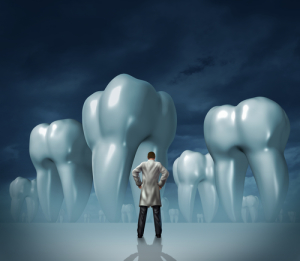 By now you’ve probably heard that the enamel covering your teeth is the strongest natural substance found in your body. It has to be hard; how else could it possibly withstand the stress inflicted by biting, chewing, and exposure to hot and cold substances? Despite its relative hardness, tooth enamel isn’t totally invincible. And while it offers some protection against the destructive effects of acids and other potentially harmful substances, it has its limits. Astoria, NY dentist Dr. Jeffrey Leibowitz shares useful information about enamel erosion.
By now you’ve probably heard that the enamel covering your teeth is the strongest natural substance found in your body. It has to be hard; how else could it possibly withstand the stress inflicted by biting, chewing, and exposure to hot and cold substances? Despite its relative hardness, tooth enamel isn’t totally invincible. And while it offers some protection against the destructive effects of acids and other potentially harmful substances, it has its limits. Astoria, NY dentist Dr. Jeffrey Leibowitz shares useful information about enamel erosion.
Common Causes of Tooth Erosion
Without sufficient tooth enamel, the dentin beneath its surface is exposed, resulting in sensitivity and an increased risk for tooth decay. Understanding risk factors for erosion could help you avoid the need for fillings, crowns, or even tooth loss. These include:
- A diet that’s high in sugar: Sugar fuels bacteria living in your mouth, resulting in the production of destructive acids. The problem becomes worse when teeth are not cleaned properly.
- Aggressive brushing or using a toothbrush with medium or hard bristles: The American Dental Association advises that a soft-bristled toothbrush is best.
- Dry mouth: Your saliva acts as a natural buffer against acid. Decreased saliva production, whether caused by medication or health condition, has been linked to cavities, bad breath, and oral infections.
- Alcoholism and eating disorders: Binge drinking, bulimia, and chronic alcoholism are associated with frequent vomiting, which introduces corrosive stomach acids to the throat and teeth.
Telltale Signs of Enamel Erosion
Erosion doesn’t happen overnight, so it may take before you notice symptoms. Teeth may appear yellow in places, which many people mistake for staining. Actually, this is caused by exposing the yellow layer of dentin beneath the enamel. As enamel weakens and erodes, you may note areas of the teeth that appear smoother and more shiny than usual; this indicates mineral loss. The teeth may also take on jagged or uneven edges, or you may notice small dents in your teeth, usually in areas used to chew and bite your food.
Protecting Tooth Enamel
The good news is that preventing erosion takes minimal effort. It can be as simple as rinsing your mouth with plain water after enjoying an acidic food, or you could follow an acidic food with either cheese or a glass of whole milk. If you do opt for fruit juice or soda, it’s best to use a straw; this limits contact with your teeth. If you find yourself fighting dry mouth, your dentist can recommend a saliva substitute or over-the-counter product. Even chewing sugar-free gum helps with acidity; look for gum that contains Xylitol.
Questions about enamel erosion? To learn more about preventing erosion, or to schedule an appointment with Dr. Jeffrey Leibowitz, contact us at (718) 728-8320. We welcome residents of Astoria, Queens, NYC, upstate New York, and New Jersey.


